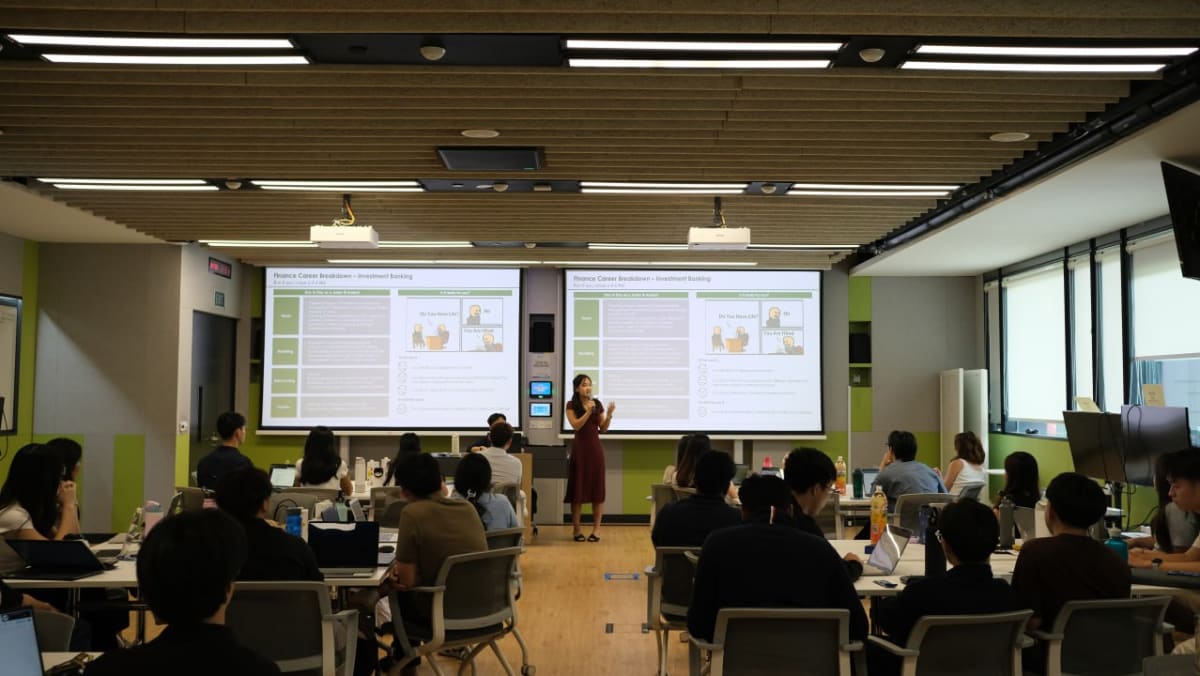Entry-level positions in banking and other finance industry firms are proving harder than ever to secure as applicant numbers rise and openings dwindle.
That’s why a growing number of undergraduates are turning to university finance clubs as a coveted stepping stone to their dream job in the sector.
But getting accepted into these student-led clubs, which can offer vital inside knowledge and know-how, is no walk in the park. Some clubs accept fewer than 10 per cent of applicants.
The NUS Asset and Wealth Management Club, for example, had 400 students apply to join last year but less than 10 per cent were accepted.
The process can involve meticulous screenings of resumes, case studies that must be submitted within a week as multi-page presentation decks with supporting spreadsheet calculations, and in-person interviews covering industry knowledge and pitch delivery.
Students interviewed by CNA TODAY acknowledged the process can be gruelling but said it was worth it, given what they gained from joining a finance club.
These university finance clubs are student-led groups that offer undergraduates opportunities to explore careers in finance, build practical skills and connect with industry professionals.
Students said these clubs typically meet weekly and activities often include guest talks, workshops, internal and external case competitions, as well as office visits to financial institutions.
The clubs offer early exposure to the industry and a chance to apply what they learn beyond the classroom.
Many clubs also focus on specific areas within finance, allowing students to deepen their knowledge in niche fields such as sustainable finance, investment banking, or asset and wealth management.
Data shows that while more business graduates are entering the workforce, a smaller proportion are landing full-time permanent roles after graduation.
According to the Singapore Department of Statistics, the number of graduates from business and administration courses has been climbing steadily over the past decade – reaching 3,596 in 2023, up from 3,308 in 2022 and 2,933 in 2021.
Yet employment outcomes over this period have weakened.
Figures from the Joint Graduate Employment Survey – conducted by the six autonomous universities and published by the Ministry of Education – show that 84.4 per cent of fresh business graduates in 2024 secured full-time permanent jobs. This was down from 88.3 per cent in 2023 and 91 per cent in 2022.
One possible reason: a marked slowdown in hiring in the financial and insurance services sector – a key destination for business graduates.
In 2022, the sector hired 13,900 people. This fell to 9,300 in 2023, and slumped further to 4,900 in 2024, according to data published online by the Singapore Department of Statistics.
Against this backdrop, human resource experts told CNA TODAY that competition for graduate entry-level roles in the finance sector has intensified.
Mr Kenji Naito, group chief executive officer at recruitment firm Reeracoen, said the hiring landscape has grown more competitive for several reasons.
These include an oversupply of finance graduates from both local and overseas institutions, greater student interest in finance careers, and rising employer expectations that new hires will possess digital skills such as data analysis and automation.
Mr Naito also pointed to hiring freezes and role consolidation in some parts of the industry, as well as more selective evaluation processes introduced since the COVID-19 pandemic.
Reeracoen supports hiring for a range of financial sector clients, including global investment banks, Big Four accounting firms, insurance groups, family offices and fintech companies.
Mr Naito said applications for entry-level finance roles have jumped in recent years. Around 2018 and 2019, just before the COVID-19 pandemic, it was common to see 150 to 400 applications per role.
While those numbers dipped slightly in 2020 and 2021 amid a hiring slowdown, they have since rebounded strongly, he said.
Today, competitive graduate finance roles – particularly in front-office or analyst positions – can attract between 300 and 800 applications per role, he said.
As competition for entry-level banking roles heats up, Ms Lim Chai Leng, general manager at recruitment agency Randstad Singapore, said hiring managers now have higher expectations and are casting a wider net when screening applicants.
“(They) would prefer to interview a broader pool of candidates to identify those who best fit the company’s needs and culture,” she added.
To this end, participation in campus finance clubs can give candidates a “distinct edge” when pursuing a career in the industry.
“Involvement in these clubs is often seen as a valuable addition to a resume, as it showcases both a genuine interest in the industry and a proactive approach to professional development,” said Ms Lim.
FIRST STEP INTO THE INDUSTRY
As such, to stand out in the crowded field, several business and finance undergraduates told CNA TODAY they chose to join a campus finance club.
Many view joining these clubs as a first step into the industry – a way to demonstrate their interest and commitment, particularly when applying for their first internship in finance.
Mr Tommy Ang, 22, business undergraduate at the Nanyang Technological University (NTU), said he felt the need to bolster his credentials after his first year of university.
“I felt that my understanding of finance was lagging behind that of many of my peers, and I didn’t feel well-prepared for the workforce. At the same time, I found finance to be an interesting field but wasn’t sure where or how to begin.”
This prompted Mr Ang, who is pursuing a specialisation in risk analytics, to join two finance clubs at the university: the NTU Investment Banking Club and its Risk Advisory and Analytics Club.
Some students also join clubs aligned with their specific areas of interest, such as investment banking or asset management, to build deeper, sector-specific knowledge.
This was the case for Mr Darren Loo, a 23-year-old undergraduate at Singapore Management University (SMU), who joined the university’s Sustainable Investment Club.
A third-year student at SMU’s College of Integrative Studies, Mr Loo is pursuing an individualised major in sustainable finance and analytics.







